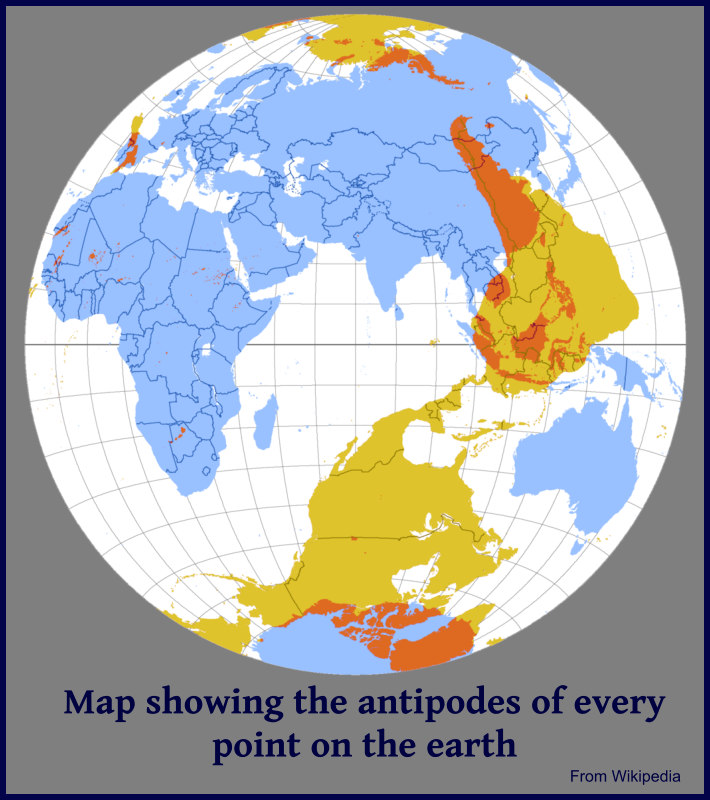A Bona Fide Circumnavigation
/ It seems there are some strict criteria for actually completing a bona fide circumnavigation … and we thought it just entailed sailing around the world and “tying the knot”, i.e. crossing your track. It seems it's much more complicated than that.
It seems there are some strict criteria for actually completing a bona fide circumnavigation … and we thought it just entailed sailing around the world and “tying the knot”, i.e. crossing your track. It seems it's much more complicated than that.
For example, Guiness states that:
A true circumnavigation of the Earth must:
- Start and finish at the same point, traveling in one general direction
- Reach two antipodes (antipodes are two points on the Earth that are diametrically opposite each other, i.e. a straight line drawn between the two points would pass through the center of the Earth)
From the above, it follows that a true circumnavigation must:
- Cross the equator a minimum of two times
- Cross all longitudes
- Cover a minimum of 40,000km or 21,600nm (a great circle)
Francis Chichester, the famous British sailor who completed a solo circumnavigation on Gypsy Moth in the 1960s, the Explorers Web Adventure Stats, and many others use the same criteria. The World Sailing Speed Record Council uses a slightly different criteria, however. They state that the vessel must start from and finish at the same port, cross all meridians of longitude, cross the equator, and travel at least 21,600 nautical miles. Each leg must commence at the exact point where the previous finished off (meaning the legs cannot be completed out of order). They have no requirement to reach antipodal points.
I know – this is way too much trivia, and why do we care anyway? We care because a circumnavigation is an achievement, and it is human nature to attempt to set records accomplishing it. Who was the fastest? the youngest? the oldest to circumnavigate the globe? And to set a record circumnavigating the globe, there must be a definition of what constitutes a circumnavigation. While sailing around the world via a route entirely in the Southern Ocean would be an admirable feat, the distance traveled would be well under 10,000 nautical miles, less than half the distance of a great circle of the Earth, and it is not reasonable to call this a true circumnavigation.
Some interesting circumnavigations:
First circumnavigation: Juan Sebastián Elcano and the remaining members of Magellan's crew. They set out with 5 ships and 200 men in 1519, and returned to Spain after a west-about circumnavigation with 1 ship and 18 men who were barely alive. Maybe this was also a record for the highest crew attrition rate for a circumnavigation?
First solo circumnavigation: Joshua Slocum on Spray in 1898. He actually had four sets of antipodal points on his trip.
First nonstop solo circumnavigation: Bernard Moitessier. He was a participant in the 1968 Golden Globe Race, but dropped out of the race, deciding to continue on to Tahiti and not return to the finish line in England. While he didn't finish the race, he circled the globe 1-1/2 times, and actually closed the loop for a circumnavigation before the race winner, Robin Knox-Johnson.
Most amazing: Jon Sanders who completed a non-stop, solo, unassisted triple circumnavigation in 1988. He was alone at sea for 658 days. Wow!
So how did we stack up? Was our trip around the world a bona fide circumnavigation? Here are our particulars:
- Starting and ending port: Cape Town, South Africa
- Distance required: 21,600 nm; Distance sailed: 47,409 nm
- Equator crossings: 2
- All longitudes traversed
- Antipodes: Florida to Panama 12 Jan 2008 – 0820 14 degrees 43 min N/ 80 degrees 05 min W Fremantle to Cape Town 21 Sept 2014 – 0300 14 degrees 43minutes S / 99 degrees 55 min E
- Direction: Generally west-about
It took us eight years and we certainly didn't set any records (although if it took us much longer, we might have qualified as either the slowest or the oldest circumnavigators). While our meandering route encompassed more than double the distance required, I didn't find a record for the longest sail around the world, but probably no record there either. By any definition, however, it was a bona fide circumnavigation … accomplished by sailing just a little further.



